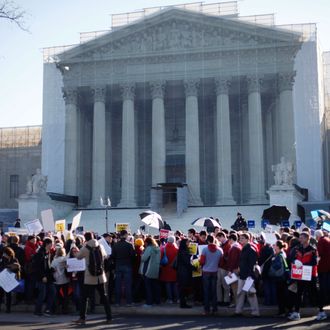
Although rulings in the landmark affirmative-action and gay-marriage cases have yet to be announced, the Supreme Court made major science news today with a unanimous decision that human genes cannot be owned by a company. DNA, according to the ruling, is “a product of nature and not patent eligible merely because it has been isolated,” although patents can stand if the genetic material, known as cDNA, was created synthetically in a lab. The case centered on patents held by Myriad Genetics, Inc. for the isolated human genes BRCA1 and BRCA2, which can indicate the risk of breast and ovarian cancer through testing, as recently brought to prominence by Angelina Jolie.
“The cost of testing for BRCA1 and BRCA2, at more than $3,000 in the United States, remains an obstacle for many women,” Jolie wrote in the New York Times last month. Now that may change.
“Today, the court struck down a major barrier to patient care and medical innovation,” said Sandra Park of the ACLU, which helped bring the case. “Because of this ruling, patients will have greater access to genetic testing, and scientists can engage in research on these genes without fear of being sued.”
“Myriad did not create anything,” Justice Clarence Thomas wrote in the decision. “To be sure, it found an important and useful gene, but separating that gene from its surrounding genetic material is not an act of invention.”





























